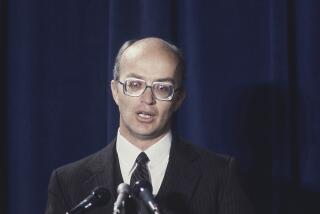Adm. Watkins Called Analytical, Unswayed by Politics
- Share via
WASHINGTON — Adm. James D. Watkins, the imposing 6-foot-4, silver-haired former member of the Joint Chiefs of Staff who is President-elect Bush’s choice to head the Energy Department, often tells the story of a pivotal moment in his most recent public role, that of chairman of the presidential AIDS commission.
It occurred as he listened to the poignant testimony of the mother of a 12-year-old AIDS-infected boy who had been isolated by his classmates and his community.
“That gets you,” he said in a recent interview with The Times. “The ignorance that generates stupid policies. People who aren’t willing to listen. Those things all get to you.”
Backs Anti-Bias Law
It was a turning point for him, one that persuaded him of the need for strong anti-discrimination laws to protect the AIDS-afflicted, which became the centerpiece recommendation of the panel’s report.
The incident discloses something of the way in which Watkins approaches his professional responsibilities. Those who know him best and who have worked with him throughout his long Navy career--including four years as chief of naval operations--and during his assignment on the AIDS commission describe him as an independent, analytical thinker who is unswayed by politics or special interests, open to new ideas, and--most important--someone who strives never to lose sight of the human side of public policy.
“He’s a beautiful, beautiful man--that’s why I fell in love with him,” said Sheila Watkins, his wife of nearly 39 years. “He’s always been decent and compassionate.”
Little was known publicly about Watkins outside the defense community when he assumed leadership of President Reagan’s beleaguered AIDS commission during the fall of 1987, and he was much feared by gay rights groups and others.
Helped Design ‘Star Wars’
At first, he seemed an unlikely hero in the AIDS war: strongly dedicated to the military, where he had helped design “Star Wars,” a man who believed that the military’s ban on homosexuals was “a sound policy,” a deeply religious Catholic and the father of six children.
But he was instrumental in issuing a report that was almost universally praised for its sensitivity and sound public health proposals. And he was credited with single-handedly resurrecting a commission that had been on the verge of collapse and steering its diverse and squabbling members toward a series of conclusions that were bold, thoughtful and devoid of moral judgments.
He may have to do some similar juggling in his newest post, because he will be confronted by many controversial issues. They include the massive job of cleaning up the country’s troubled nuclear weapons plants and grappling with tough environmental questions involving the problem of global warming, the so-called “greenhouse effect.”
Watkins has a strong nuclear background, which began during his early Navy years when, as an ensign, like former President Jimmy Carter, he worked for Adm. Hyman G. Rickover in the nuclear submarine program. In 1982, when Rickover died, Watkins delivered the eulogy.
“Rickover had an intense interest in getting involved with the best and the brightest, and he drove it very hard,” Watkins once said. “He shook me out of my malaise. Until then, I didn’t know what it meant to drive yourself to your maximum potential.”
He was graduated in 1949 from the U.S. Naval Academy and has served as commander of the 6th Fleet, vice chief of naval operations and commander in chief of the Pacific Fleet. He was chief of naval operations from 1982 until his retirement in 1986.
He received a master’s degree in mechanical engineering in 1958 and is a graduate of the reactor engineering course at the Oak Ridge National Laboratory. He has many years of experience in nuclear propulsion, including command of a nuclear-powered attack submarine and combat service as executive officer aboard the world’s first nuclear-powered cruiser, the Long Beach.
James David Watkins was born on March 7, 1927, the sixth of seven children, in Alhambra, Calif. His California roots go back to the Civil War, when his grandparents moved there from the East. His father, Edward Francis Watkins, grew up on a ranch next to George S. Patton Jr., the most famous U.S. tank commander of World War II. They played “cowboys and Indians” together as children.
“They used to switch sides,” Watkins said. “But it didn’t matter who took what side. Patton always won.”
His father, who worked for his father-in-law, George Clinton Ward, president of Southern California Edison Co., worked with the Mexican-American community in Alhambra. His mother, Louise Ward, ran unsuccessfully for the Republican nomination for the Senate in 1938--an extremely rare activity for a woman in those days--and supported Gen. Douglas A. MacArthur for President in the 1940s.
Watkins has described her as a historian, “a woman of arts and letters,” who dropped out of Smith College to go to Europe, where she learned French and wrote several books.
“She had a tremendous impact on me,” Watkins said. “Every night at the dinner table, we’d sit together, the nine of us, and she’d be talking about education, politics and art. Father was more quiet. He’d be serving the lamb. I got the humanitarian side from my father and the intellectual side from my mother.”
Watkins received an appointment to the naval academy in 1945. Ironically, when he had applied earlier, he didn’t make the cut. He placed too low on the the civil service examinations. He remembers coming home and telling his mother: “You know what they asked me? Twenty questions on ‘The Tempest.’ I never read that.”
He recalled her response. She was disgusted. “ ‘The Tempest’ was one of (Shakespeare’s) worst plays,” she said.
More to Read
Get the L.A. Times Politics newsletter
Deeply reported insights into legislation, politics and policy from Sacramento, Washington and beyond. In your inbox twice per week.
You may occasionally receive promotional content from the Los Angeles Times.










